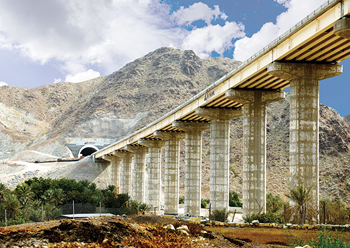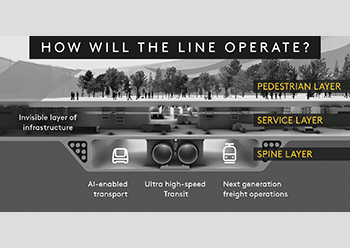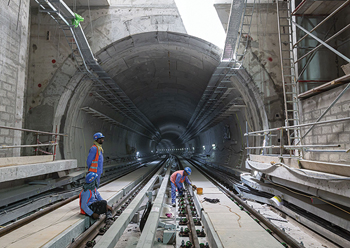
 The Etihad rail network involved the construction of 593 bridges and crossings of all types.
The Etihad rail network involved the construction of 593 bridges and crossings of all types.
Etihad Rail, the developer and operator of the UAE National Rail Network, has confirmed its intention to push ahead with the passenger service on the country’s railway network with the signing of an agreement last month.
The agreement will see the launch of the region’s first luxury train experience in partnership with Italian luxury hospitality company Arsenale – and for this, a passenger service needs to be well in place on the network.
“By establishing a luxury train experience, we are introducing a unique world-class offering to the region and contributing to boosting the tourism sector in the UAE. Furthermore, we will be able to showcase the country’s diverse heritage and beauty to visitors from around the world,” said Shadi Malak, CEO of Etihad Rail, after signing the deal at Middle East Rail, the largest transport event in the region held last month in Abu Dhabi.
 |
|
Officials of Etihad Rail and Italian company Arsenale sign the key agreement. |
The agreement was among seven major pacts inked by Etihad Rail to support the operations of the network and ensure its commercial success. Other deals were inked with:
• DHL Global Forwarding – a division of Deutsche Post DHL that provides air and ocean freight forwarding services – to set up a joint venture company to strengthen Etihad Rail’s sustainable freight offering within the UAE;
• Morocco’s national railway operator ONCF, on knowledge sharing and best practice learnings;
• Micco, an integrated logistics provider and part of AD Ports Group, to establish an intermodal freight solution;
• Uber, to support Etihad Rail’s ability to provide accessible transportation across the UAE, including in areas with limited accessibility;
• Drone cargo specialist SkyGo, to collaborate on freight train drone inspection, utilising the company’s technology to benefit from data services; and
• Fujairah Natural Resources Corporation (FNRC), an independent government entity controlling mining facilities in Fujairah, to provide an integrated transportation service.
These agreements follow the completion in late February of the construction of the 1,200-km Etihad Rail network.
On the occasion, HH Sheikh Mohammed bin Rashid Al Maktoum, Vice-President and Prime Minister of the UAE and Ruler of Dubai, announced the launch of freight train operations across all the emirates. The operation of the freight trains throughout the UAE involves a fleet of 38 locomotives and more than 1,000 wagons capable of transporting all types of goods.
 |
|
The UAE national railway network passes through a variety of geographical terrains. |
The launch of the freight services marks the completion of the first of three projects announced under the AED50 billion ($14 billion) UAE Railway Programme in December 2021. The next phase is the launch of passenger services, which is yet to be announced. In June last year, Etihad Rail awarded a AED1.2-billion contract to Spanish group CAF for delivery of passenger trains for the new rail network. Under the terms of the agreement, CAF will design, manufacture, supply, and provide maintenance for passenger trains as per the European standards. Each train will have a seating capacity of over 400 passengers, and will run up to 200 km/h.
The passenger train service will connect 11 cities and regions in the UAE from Al Sila to Fujairah, including Al Ruwais, Al Mirfa, Dubai, Sharjah, Al Dhaid, and Abu Dhabi. It is designed to be able to transport passengers from Abu Dhabi to Dubai in 50 minutes and to Fujairah in 100 minutes.
Etihad Rail had recently signed three MoUs with Spain’s national railway operator Renfe, and the British companies High Speed 1 and GB Railfreight, to enhance cooperation and the exchange of knowledge, expertise, and the best practices in in freight and passenger rail services and rail operations.
In February 2022, Etihad Rail also signed an agreement with First Abu Dhabi Bank (FAB) for financing the railway passenger transport services, with a total value of AED1.99 billion as part of the UAE National Railways Programme.
Largest project
The project, launched in 2009, is the largest infrastructure project in the UAE’s history and now link the seven emirates with a main railway network. According to Etihad Rail, 11 contractors, 25 consultants, and 28,000 specialists worked on the project. It took 133 million working hours to complete, and 40,000 approvals from 180 government agencies. More than 1,000 operational documents have been produced, including instructions, handbooks, guidelines, policies, operating procedures, agreements, and others.
The main line of the UAE National Rail network extends from Ghuweifat, on the border with Saudi Arabia, to Fujairah.
The first stage of the network, which is 264-km long, was completed in 2016. This stage connects the Shah and Habshan gas fields in Abu Dhabi to the Ruwais port and has been fully operational since January 2016.
The second stage of the network extends across the UAE from Ghuwaifat, connecting the emirates via Abu Dhabi, Kizad, Khalifa Port, Jebel Ali Port, Dubai, Sharjah, Ras Al Khaimah and thence to Fujairah on the UAE’s east coast. Work on this stage started in early 2020 and was completed early this year.
The UAE national railway network passes through a variety of geographical terrains, within a large-scale engineering plan that included the construction of 593 bridges and crossings of all types, and nine tunnels with a length of 6.5 km. It involved some 120 million cu m of excavation work, says Etihad Rail.
The project has contributed to supporting the local industry by assigning 215 companies and local entities. Also, 70 per cent of the building materials used in the project are produced by the local industry, according to the developer.
Freight Trains
Etihad Rail’s fleet of the most modern freight trains in the region includes 38 locomotives, with a capacity of 60 million tons of goods annually.
Each goods transport’s locomotive operates with a power of 4,500 horsepower, equivalent to 3,400 kilowatts - one of the most powerful freight train engines in the Middle East.
The freight trains will run up to 120 km/h. The standard width of the rail is 1,435 m, and it operates under the European ETCS level 2 signalling system. It has been specially designed to withstand the geographical nature, climatic conditions, high temperatures and humidity in the GCC region, to ensure high levels of performance, efficiency and sustainability.
The freight trains will connect four major ports include seven logistics centres across the country, to serve trains and related businesses.
The network also includes a number of charging stations located in Ruwais, Industrial City of Abu Dhabi (ICAD), Khalifa Port, Dubai Industrial City, Jebel Ali Port, Al Ghail and Fujairah Port. These locations are a major hub for local and regional distribution and logistics services, as it includes customs warehouses and on-site cargo inspection services.
The UAE National Railway Network has the ability to transport all types of goods, including petrochemicals, raw steel, limestone, cement, building materials, industrial and domestic waste, aluminium, food commodities, and general cargo. It is expected to contribute to supporting the national economy at a value of AED200 billion, and saving AED8 billion in the cost of road maintenance. The network’s tourism benefits are estimated at AED23 billion.
The project also supports the UAE’s sustainable development goals and contributes to achieving the UAE Net Zero by 2050, through reducing carbon emissions in the road transport sector by 21 per cent, and reducing road transportation emissions per capita by 40 per cent, by 2050.
Oman-UAE link
Meanwhile Etihad has tied up with Oman Rail, the sultanate’s national developer, to set up a joint venture company, Oman-Etihad Rail Company, at a total investment of $3 billion, that will design, develop and operate a railway network connecting Sohar Port to the UAE national rail network.
Under this agreement, Oman-Etihad Rail will lay the groundwork and workplan for the project, including its financial mechanisms and schedule. The company will also handle the design, development, and operation of the rail network, which connects Sohar and Abu Dhabi, in line with the standards of the two countries.
The 303-km railway will feature the best international safety, security, and environmental standards, to provide faster and safer passenger and freight services.
The passenger trains are designed to reduce travel time from Sohar to Abu Dhabi to 1 hour 40 minutes, and from Sohar to Al Ain to 47 minutes, travelling at a maximum speed of 200 km/h. Meanwhile, the freight trains will run up to 120 km/h.








.jpg)




.jpg)




























.jpg)



































